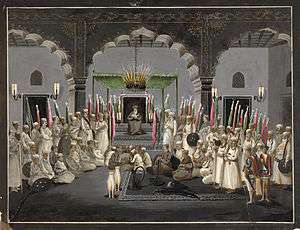Isha prayer
| Part of a series on |
| Islam |
|---|
 |
|
Related topics |
|
The Isha prayer (Arabic: صلاة العشاء ṣalāt al-ʿišāʾ IPA: [sˤalaːt alʕiʃaːʔ], "night prayer") is the night-time daily prayer recited by practising Muslims. It is the fifth of the five daily prayers–[1] (salat) [Islamic evening begins at maghrib]. The five daily prayers collectively are one pillar of the Five Pillars of Islam, in Sunni Islam, and one of the ten Practices of the Religion (Furū al-Dīn) according to Shia Islam. It is a four rak'ah prayer and the first two rak'ah are prayed aloud. When travelling, according to some madhhabs, it may be reduced to two rak'ahs.
In Islam, the Isha' daily prayer has four required (Fard) rak'ah. However, in Sunni Islam, the two Sunnah rak'ah following the Isha' are highly recommended and so is the third rakat Wajib Witr. There are a few optional prayers that can be recited after the Isha' prayer, including the Nafilat ul-Layl prayers (together termed tahajjud), as well as the tarawih in Ramadan.
Ahadith mentioning virtues of Isha Salat

Uthman bin Affan reported that he heard Muhammad saying: "The one who offered Isha salat in congregation, it was as if he remained in salat up to midnight, and he who offered the Fajr salat in congregation, it was as if he remained in salat the whole night." From Muslim Abu Hurairah reported: The Messenger of Allah said, "No Salat is more burdensome to the hypocrites than the Fajr (dawn) prayer and the `Isha' (night) prayer; and if they knew their merits, they would come to them even if they had to crawl to do so. [Al-Bukhari and Muslim].
Sunni Muslims
The time period within which the Isha prayer must be recited is the following:
- Time begins: According to the Hanafi school, Isha begins when complete darkness has arrived and the white twilight in the sky has disappeared. According to the Maliki and Shafi'i schools, the time begins when the red thread has disappeared from the sky. These times can be approximated by using the sun as a measure. When the sun has descended 12 degrees below the horizon, it is approximately equivalent to the disappearance of the red from the sky. For approximating when complete darkness begins, some astronomers argue that it occurs when the sun has descended 15 degrees below the horizon while others use the safer measure of 18 degrees.
- Time ends: At the beginning of dawn when the time for Fajr prayer begins. However, it is frowned upon to delay the prayer without a legitimate reason past the first third of the night, and "night" in Islamic law means the time between the entrance of the Maghrib prayer and the entrance of the Fajr prayer. According to an opinion in the Maliki school, the prohibition is from delaying the prayer beyond the first half of the night, rather than just the first third.
Shia Muslims
The time period within which the Isha prayer must be recited is the following:
- Time begins: once Maghrib (evening prayer) has been recited.[2]
- Time ends: at midnight, the midpoint between shafak and dawn.
However, it is very important to recite the prayer as soon as the time begins. Often Maghrib and Isha are offered together with a small gap in between
See also
- Salat (Prayer)
- Wudhu
- Fajr (Dawn prayer)
- Dhuhr (Mid-day prayer)
- Asr (Afternoon prayer)
- Maghrib (Sunset prayer)
- Isha' (Night prayer)
- Dhikr
- Tasbih
